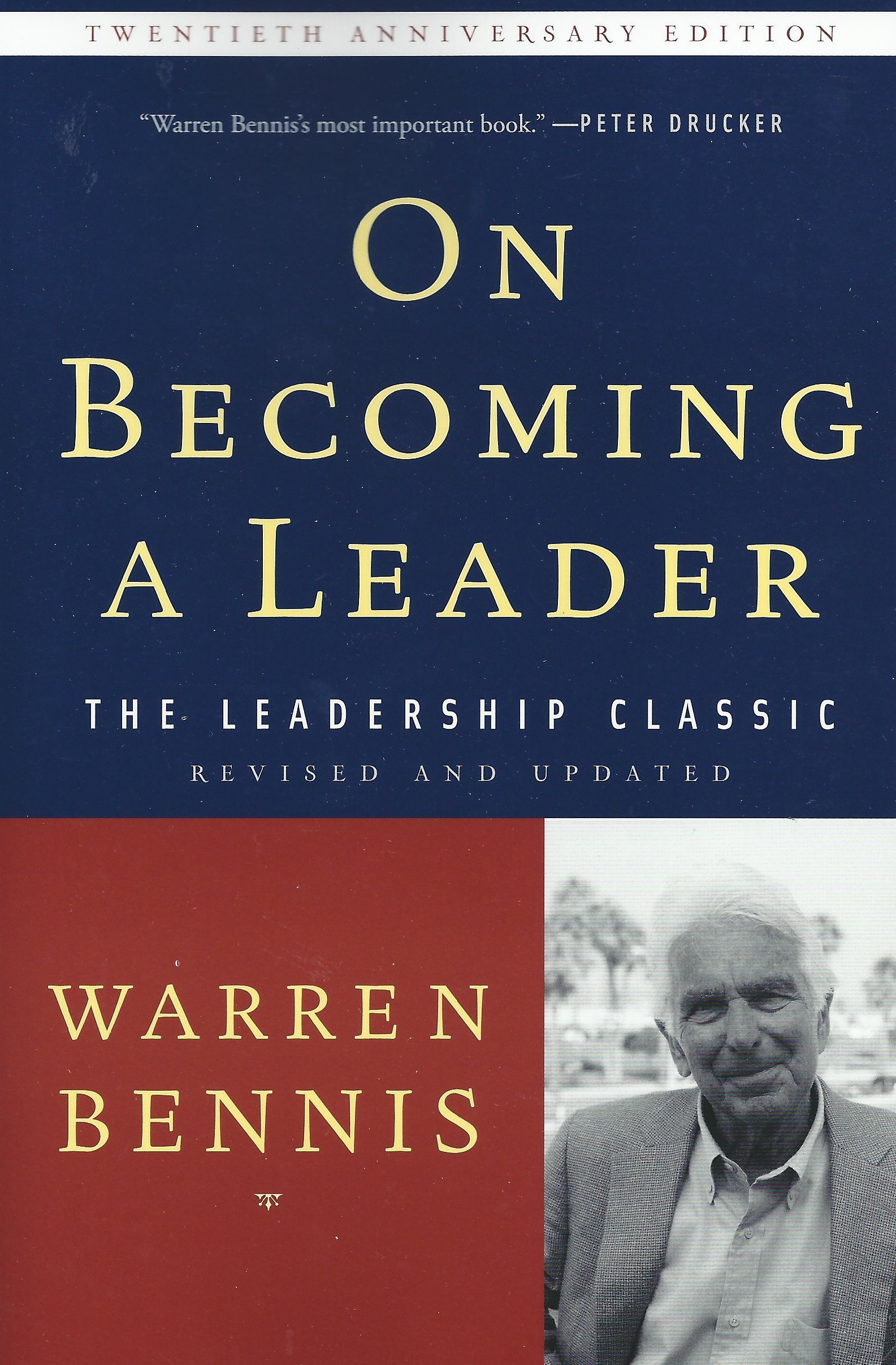“Managers do things right.
Leaders do the right thing.”
Leadership guru Warren Bennis’s guide to honing your inner leader tends to read more like a self-help book than a business tutorial. Bennis’s now classic take on the leadership conundrum calls the dearth of effective leaders a “societal disease” characterized by shortsighted thinking and a lack of self-awareness. The proposed solution? Pointers include honing your “inner voice,” cultivating a passion for what you do, and building trust among followers. [content.time.com]
Warren Bennis authored the book titled, On Becoming a Leader in 1989, where he outlines the subject of leadership, and the plans for implementation in ten chapters. This paper outlines Bennis’ basic ideas, his theories, his contributions to the field of leadership, and a comparison of his work to Bass and Avolio 1994 book titled Improving Organizational Effectiveness Through Transformational Leadership. [from: www.ramdelarosa.blogspot.com]
This book should be at the top of the reading list in any serious study of leadership. This is the second of two volumes on leadership that have established Warren Bennis as an authority on the subject. The first book, Leaders, focused on the “what” of leadership. On Becoming A Leader presents the “how” of leadership by examining 28 case studies of leadership. Bennis distills out of these interviews common themes and attributes of the leadership experience. Both the personal qualities of these people and the environments in which they emerged as leaders are examined.
This is not a “how to” book on becoming a leader. Bennis gives clear warning in his introductions that the road to leadership is fraught with challenges. He dismisses the “leadership in a weekend” type course as the “microwave theory of leadership training: pop in Mr. or Mrs. Average and in 60 seconds out comes a leader.” He even qualifies the more legitimate courses of study by the observation that while leadership courses can teach skills; they cannot teach leadership qualities such as vision and character.
Nor is it an autobiography of a leader’s personal experience. Warren Bennis has been a teacher and student all his life. He has never run a company or a country. Bennis is not directly recounting his own experiences as a leader (though in a pointed aside he remarks that the classroom is a potential site for the emergence of leadership).
Bennis’ value is in his scholarship: his ability to distill from the experiences of successful leaders a set of lessons on how to achieve successful leadership. These lessons are punctuated by anecdotal stories and vignettes by the leaders who lived these lessons. This format creates a highly credible, compelling, and sometimes-dramatic presentation that is very readable and thought-provoking.
[from: www.projectconnections.com]
“Leadership is the capacity to translate vision into reality.”
What is a leader?
The book provides many fine insights. Perhaps the key one is that true leaders are not interested in proving themselves; they want above all to be able to express themselves fully. Proving oneself implies a limited or static view of the self, whereas the leader, by continually seeking his or her fullest expression, must be willing to engage in periodic reinvention. For Bennis’s leaders, life is not a competition, but a flowering. Structured education and society often get in the way of leadership. Real learning is the process of remembering what is important to us, and becoming a leader is therefore the act of becoming more and more yourself.
Leadership is an engagement with life itself, because it demands that your unique vision be accomplished, and that usually involves a whole life. When people protest that they can’t lead, or don’t want to lead, they are usually thinking of management and giving speeches. But leadership is as varied as people, and the main question is not whether you will be burdened, but how you are challenged to escape mediocrity and conformity and really lead yourself.
Becoming a leader involves:
- Continuous learning and never-dying curiosity;
- A compelling vision; leaders first define their reality (what they believe is possible), then set about ‘managing their dream’;
- Developing the ability to communicate that vision and inspire others to follow it;
- Tolerating uncertainty and taking on risk – a degree of daring;
- Personal integrity: self-knowledge, candour, maturity, welcoming criticism;
- Being a one-off, an original. “Leaders learn from others, but are not made by others”, Bennis notes;
- Reinvention. To create new things sometimes involves re-creating ourselves. We may be influenced by our genes and environment, but the leader takes all his or her influences and makes something unique;
- Taking time off to think and reflect, which brings answers and produces resolutions;
- Passion for the promises of life; a belief in the best, for ourselves and others;
- Seeing success in small, everyday increments and joys, not waiting years for the Big Success to arrive;
- Using the context of your life, rather than surrendering to it.
A world of leaders
Bennis’ conviction is that we badly need leaders. He wrote On Becoming a Leader when American economic leadership was being seriously challenged – we forget now, but in the late 1980s, it did seem for a while that Japan was surpassing the US in production, wealth and innovation. It only regained the ascendancy through obsession with innovation and quality and the realization that firms get ahead by assisting their employees to be all they can be.
[From: www.butler-bowdon.com/]
If you like this story, CLICK HERE to join the tribe of success-minded people just like you. You will love our weekly quick summaries of top stories, talks, books, movies, music and more with handy downloadable guides, cheat sheets, cliffs notes and quote books.
And, you can opt-out at any time – no strings, promise… CLICK HERE













